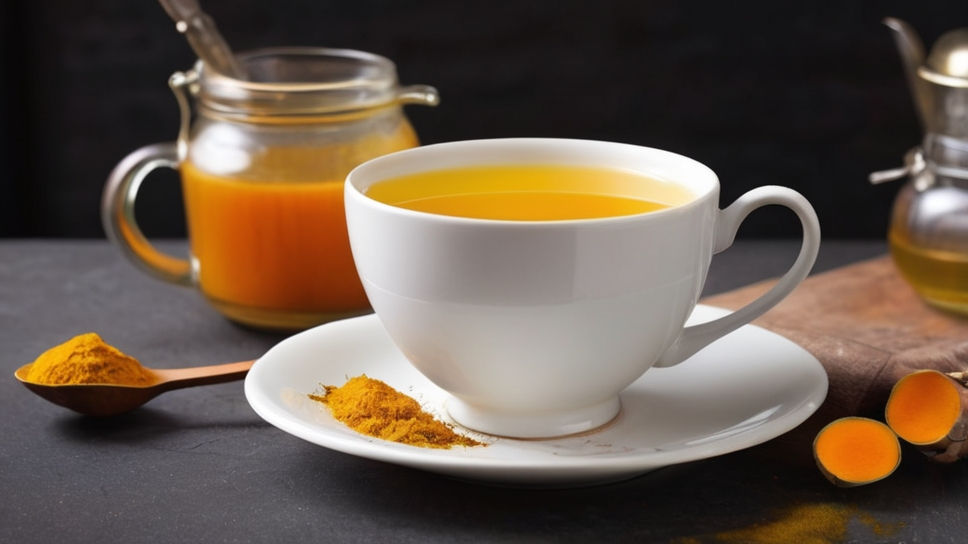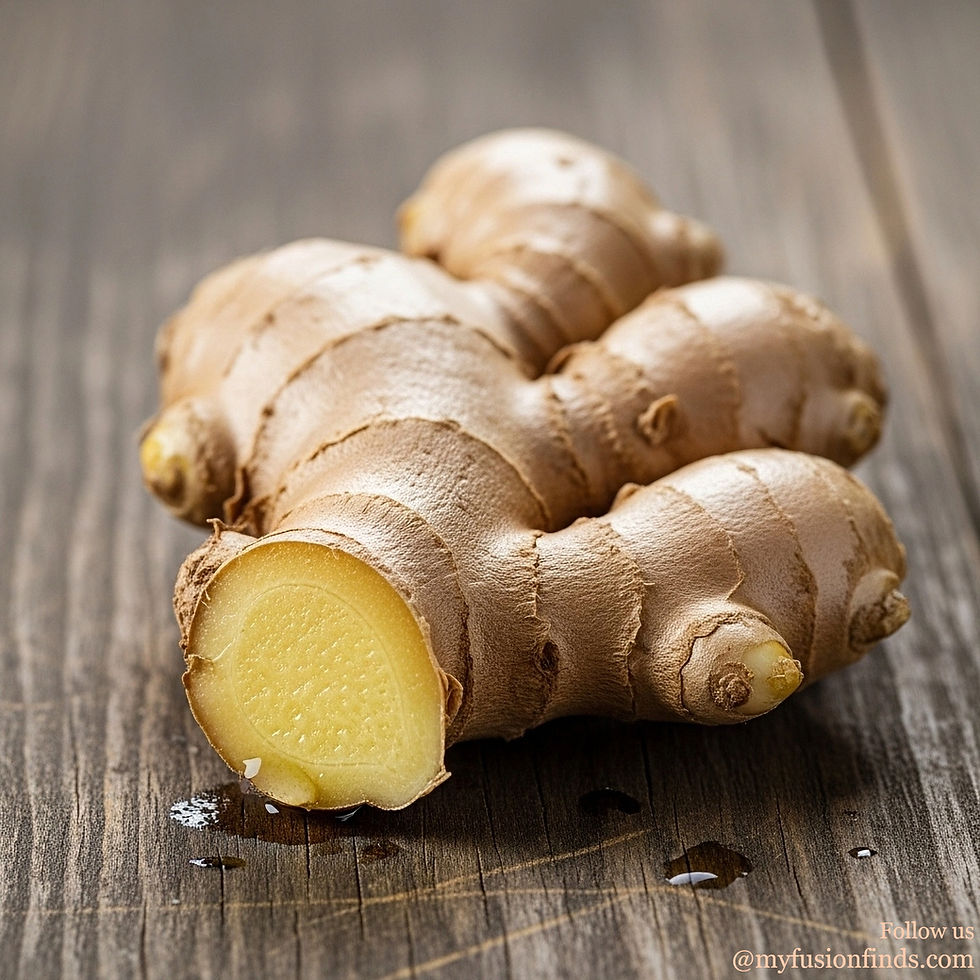Unlocking the Healing Power of Herbs and Spices for Wellness: A Closer Look
- SABA

- Jun 27, 2025
- 16 min read
Updated: Dec 16, 2025
In our rapidly evolving world, many individuals are seeking wellness through nature's gifts, turning to the time-honored remedies that have stood the test of time. Herbs and spices, frequently overshadowed by traditional treatments, provide a wealth of healing properties and advantages that are often overlooked in modern healthcare. This blog post will explore some of the most potent herbs and spices that can boost your well-being, examining their benefits, potential applications in daily life, and how they can be seamlessly integrated into your health and wellness routine.
The Historical Significance of Herbs and Spices
For centuries, herbs and spices have been integral to cultures and cuisines worldwide, serving purposes that extend far beyond mere flavor enhancement. Ancient civilizations appreciated these natural marvels, using them not only to elevate the taste of food but also for their remarkable healing properties, which were often documented in ancient texts and passed down through generations.
For example, the Egyptians utilized garlic for its medicinal properties, believing it to be a powerful aphrodisiac and a remedy for various ailments, including respiratory issues and infections. The Greeks and Romans depended on different herbs, such as oregano and thyme, to cure illnesses and prevent disease, often incorporating them into their diets as a means of promoting health. The Silk Road facilitated the exchange of exotic spices such as cinnamon and saffron, which were not only prized for their flavors but also for their purported health benefits, underscoring their significance in trade and cultural exchange.
Grasping this historical background allows us to appreciate these natural ingredients and their potential to improve wellness today. The knowledge accumulated over centuries regarding the therapeutic effects of herbs and spices can guide modern individuals in their pursuit of holistic health. By understanding the rich tapestry of history woven around these natural remedies, we can better recognize their value in contemporary wellness practices. Furthermore, as we delve deeper into the properties of specific herbs and spices, we can uncover a treasure trove of benefits that can enhance our physical, mental, and emotional well-being.
Turmeric: The Golden Wonder

Turmeric, frequently celebrated as a superfood, is a bright yellow spice that is commonly found in curry dishes and is native to Southeast Asia. This vibrant spice is derived from the rhizome of the Curcuma longa plant and has been used for centuries not only as a culinary ingredient but also as a traditional medicine in various cultures. Its active ingredient, curcumin, is recognized for its strong anti-inflammatory and antioxidant effects, making it a focal point of numerous health studies. Research has shown that curcumin may help decrease inflammation in the body, which could potentially ease symptoms of various conditions such as arthritis, inflammatory bowel disease, and even skin disorders like psoriasis.
Moreover, the health benefits of turmeric extend beyond its anti-inflammatory properties. Curcumin has been linked to improved brain function, as it may increase the levels of brain-derived neurotrophic factor (BDNF), a protein that plays a crucial role in neuronal health and cognitive function. Additionally, some studies suggest that curcumin may have potential in combating certain forms of cancer, as it appears to interfere with the growth of cancer cells and inhibit the spread of tumors. These promising findings have led to a growing interest in incorporating turmeric into daily diets as a preventive measure against various health issues.
Adding turmeric to your diet can be easy and versatile. You can incorporate it into a wide range of dishes, such as soups, smoothies, or golden milk, a traditional Indian beverage made with milk, turmeric, and spices. For those looking to enhance the flavor profile of their meals, turmeric pairs wonderfully with a variety of ingredients, including garlic, ginger, and coconut milk. Additionally, it is advisable to combine turmeric with black pepper, which contains piperine, a natural substance that significantly boosts the absorption of curcumin in the body, thereby enhancing its health benefits. This simple addition can make a notable difference in maximizing the positive effects of turmeric on health.
In conclusion, incorporating turmeric into your diet is not only a flavorful choice but also a beneficial one for overall health. Whether you choose to sprinkle it on roasted vegetables, blend it into your morning smoothie, or enjoy it in a warm cup of golden milk, the potential health benefits of this remarkable spice are numerous. As research continues to uncover the various ways in which curcumin can contribute to health and wellness, turmeric remains a staple in both culinary and medicinal practices around the world.
Ginger: The Root of Vitality

Ginger has become a fundamental spice, valued not only in culinary uses but also in natural medicine. This remarkable root, scientifically known as Zingiber officinale, has a rich history that dates back thousands of years, particularly in Asian cultures where it has been celebrated for its numerous health benefits. Traditionally, ginger was utilized to fight nausea, relieve digestive issues, and reduce inflammation. Its use as a remedy for ailments such as motion sickness and morning sickness during pregnancy has been documented extensively. Contemporary research supports its effectiveness, especially in alleviating nausea associated with pregnancy and chemotherapy. Studies have shown that ginger can significantly reduce the severity and frequency of nausea and vomiting, making it a preferred natural alternative for many seeking relief from these conditions.
Ginger is incredibly adaptable and can be used fresh, brewed as a tea, or in powdered form, catering to a wide range of culinary applications. Fresh ginger, with its potent flavor and aroma, can be grated into dishes, added to stir-fries, or used in marinades to enhance the taste of meats and vegetables. Steeping fresh ginger in hot water produces a soothing tea that supports digestion and provides relief from various gastrointestinal issues. This ginger tea is not only comforting but also packed with antioxidants and anti-inflammatory properties that can benefit overall health. Additionally, powdered ginger can be incorporated into baked goods, smoothies, and even savory dishes, making it a versatile ingredient in both sweet and savory recipes. The medicinal qualities of ginger extend beyond nausea relief; it has also been recognized for its potential to lower blood sugar levels, improve heart health, and even provide relief from menstrual pain. As such, ginger continues to be a staple in both kitchens and medicine cabinets around the world.
Cinnamon: The Sweet Spice

Cinnamon is not only a delightful and aromatic enhancement to various dishes such as oatmeal, baked treats, and even beverages, but it is also highly valued for its remarkable ability to manage blood sugar levels. This makes it a favored option for individuals with diabetes, as it can help improve insulin sensitivity and lower fasting blood sugar levels.
Numerous studies have indicated that cinnamon can play a significant role in glucose metabolism, thus providing a natural aid in the dietary management of diabetes. Furthermore, its rich profile of antioxidants contributes positively to heart health, as these compounds help combat oxidative stress and may reduce the risk of cardiovascular diseases. Additionally, cinnamon has been shown to possess anti-inflammatory properties that can assist in decreasing inflammation throughout the body, which is crucial for maintaining overall health and preventing chronic diseases.
To fully reap the myriad benefits of cinnamon, consider incorporating it into a variety of dishes and beverages. For instance, adding a sprinkle of cinnamon to your morning smoothies can not only enhance the flavor but also provide a nutritious boost. It can also be stirred into coffee or tea, offering a warm, comforting taste while reducing the need for added sugars.
Additionally, cinnamon can be used creatively in savory meals, such as in stews, curries, and marinades, where its unique flavor profile can beautifully complement spices and other ingredients. Its ability to naturally sweeten dishes allows for a reduction in the necessity for additional sugars, making it a healthier alternative for those looking to indulge their sweet tooth without compromising their health. By integrating cinnamon into your daily diet, you can enjoy its delicious taste while simultaneously promoting better health and well-being.
Garlic: The Immune Booster

Garlic is a key ingredient in cooking, recognized not only for its unique taste but also for its many health advantages. This versatile bulb has been utilized for centuries in various culinary traditions around the globe, celebrated for its pungent flavor and aroma that can elevate dishes to new heights. Abundant in sulfur compounds, garlic has been proven to boost immune function, lessening the severity of flu and cold symptoms. Research has shown that these sulfur compounds, particularly allicin, possess antimicrobial properties that can help the body fend off infections, making garlic an essential ally during the cold and flu season.
Adding fresh garlic to dishes is easy and can transform even the simplest meals into something extraordinary. Crushed or minced garlic enhances the flavor of sauces, dressings, and stir-fries, infusing them with a rich, savory depth that is hard to replicate with other ingredients. Whether you are preparing a classic marinara sauce, a zesty vinaigrette, or a vibrant vegetable stir-fry, incorporating fresh garlic can make a significant difference in the overall taste profile. To fully benefit from its health properties, try eating raw garlic, although this may require getting used to it. Raw garlic can be quite potent, so starting with small amounts mixed into salads or spreads can help you acclimate to its intense flavor while still reaping the health benefits.
Moreover, garlic is not only beneficial for its taste and health properties but also offers a myriad of culinary uses. It can be roasted to create a sweeter, milder flavor that pairs beautifully with a variety of dishes, such as roasted vegetables, meats, or even spread on bread for a delightful appetizer. When roasted, the texture becomes creamy, and the pungency mellows significantly, making it more palatable for those who may find raw garlic overwhelming. Additionally, garlic can be infused in oils, providing a subtle garlic essence that can enhance the flavor of marinades or drizzles over finished dishes.
Incorporating garlic into your diet is not only a flavorful choice but also a wise one for your health. Regular consumption of garlic has been linked to a reduced risk of heart disease, as it may help lower cholesterol levels and improve blood circulation. Furthermore, garlic is rich in antioxidants, which can combat oxidative stress and contribute to overall wellness. So, whether you choose to enjoy it raw, sautéed, or roasted, garlic is an ingredient that offers both culinary delight and numerous health benefits, making it a staple in kitchens around the world.
The Role of Peppermint in Digestion

Peppermint, scientifically known as Mentha × piperita, is a widely recognized herb that has been cherished for centuries not only for its refreshing flavor but also for its remarkable medicinal properties. This aromatic herb is commonly utilized to ease various digestive problems due to its relaxing effects on stomach muscles, which can play a significant role in promoting overall digestive health. When consumed in the form of tea or essential oil, peppermint can effectively reduce symptoms associated with indigestion, such as discomfort, gas, and bloating, making it a popular choice among those seeking natural remedies for gastrointestinal issues.
The menthol present in peppermint is known to have a soothing effect on the digestive tract, which can help relieve cramping and promote smoother digestion.
In addition to its digestive benefits, peppermint oil has been found to assist in alleviating tension headaches and sinus congestion. The cooling sensation of menthol can provide relief when applied topically to the temples or inhaled through steam, helping to clear nasal passages and promote easier breathing. This dual action makes peppermint an excellent herb not just for digestive wellness but also for overall respiratory comfort, especially during cold and allergy seasons.
Incorporating peppermint into your daily routine can be quite invigorating and beneficial for both body and mind. For instance, enjoying a warm cup of peppermint tea after a meal can not only improve digestion but also offer a calming conclusion to your day. The soothing aroma and taste of peppermint tea can create a relaxing atmosphere, helping to unwind and soothe the senses after a busy day. Furthermore, the ritual of brewing and sipping this delightful tea can serve as a moment of mindfulness, allowing you to pause and appreciate the present.
Beyond its use as a tea, peppermint can be added to various dishes, desserts, and beverages, enhancing their flavor while providing the same health benefits. From peppermint-infused smoothies to herbal blends and even savory dishes, the versatility of this herb makes it a valuable addition to any kitchen. Whether you are looking to enhance your culinary creations or simply seeking a natural remedy for common ailments, peppermint stands out as a powerful herb with a multitude of uses and benefits.
The Benefits of Basil

Basil is not only an essential component of Italian cooking but is also deeply appreciated for its numerous health advantages that contribute to overall well-being. This aromatic herb, with its vibrant green leaves and distinctive flavor, is high in antioxidants, which play a crucial role in combating oxidative stress within the body. Oxidative stress is linked to various chronic diseases, and by incorporating basil into your diet, you can help mitigate these risks and promote heart health. Studies have shown that the antioxidants found in basil, such as flavonoids and polyphenols, can lower blood pressure and improve circulation, thus enhancing cardiovascular function. Moreover, this remarkable herb possesses anti-inflammatory qualities that may aid individuals dealing with chronic inflammation, a condition that is often at the root of many health issues, including arthritis and other autoimmune disorders.
Basil is incredibly versatile and simple to incorporate into a wide range of dishes, making it an ideal addition to salads, sauces, soups, and even smoothies. Its fresh, aromatic flavor can elevate the taste profile of many meals. For a quick and refreshing beverage, consider mixing fresh basil leaves with freshly squeezed lemon juice and water to create a revitalizing natural detoxifier. This delightful drink not only hydrates but also provides a burst of flavor and nutrients that can help cleanse the body. Additionally, basil can be used in pesto, infused oils, or as a garnish for various dishes, showcasing its adaptability and enhancing the culinary experience. As you explore the many uses of basil, you’ll discover that this herb is not just a flavor enhancer but also a powerhouse of health benefits that can contribute significantly to a balanced diet.

This herb is readily available at most grocery stores, making it a convenient addition to a diverse range of culinary dishes. Cilantro, also known as coriander leaves, has gained immense popularity in various cuisines around the world, transcending cultural boundaries with its distinctive and vibrant flavor profile. This herb is not only renowned for its unique taste, which can be described as fresh, citrusy, and slightly peppery, but it is also celebrated for its rich nutritional content. Cilantro is packed with dietary fiber, iron, and a variety of phytonutrients, including vitamins A, C, and K, which are crucial for maintaining overall health and well-being.
These compounds found in cilantro are recognized for their potential health advantages, such as antioxidant properties that may help combat oxidative stress in the body. Antioxidants play a vital role in neutralizing free radicals, which can lead to cellular damage and various chronic diseases. In addition to the fresh leaves, I also include coriander seeds in my cooking repertoire. Coriander seeds, the dried fruit of the cilantro plant, offer a delightful citrusy flavor that beautifully complements many dishes. When toasted, these seeds release a warm, nutty aroma that enhances their taste and adds depth to recipes, making them an excellent choice for both savory and sweet preparations.
The blend of fresh cilantro and coriander seeds creates a symphony of flavors that enhances the taste of summer vegetables, making them stand out in salads, salsas, and grilled dishes. The fresh, herbal tones of cilantro combined with the mild spice of coriander seeds offer a harmonious balance that transforms basic seasonal produce into a lively and flavorful experience. Whether incorporated in classic recipes such as guacamole and curry or in creative culinary innovations like cilantro-infused dressings or marinades, cilantro and coriander seeds are essential staples in my kitchen. Their versatility allows them to be used in a multitude of ways, from garnishing soups to flavoring rice dishes, ensuring that every meal can be elevated with their bright and aromatic presence.
The Healing Properties of Chamomile

Chamomile, a beloved herb that has been utilized for centuries, is particularly renowned for its remarkable soothing effects on both the mind and body. This gentle flower, often associated with tranquility and peace, is a cherished remedy for enhancing sleep quality and is widely regarded as a natural sleep aid. The calming properties of chamomile make it an ideal choice for those struggling with insomnia or restless nights, as it helps to create an environment conducive to restful slumber.
Chamomile tea, in particular, is commonly enjoyed in the evening, serving as a comforting ritual that not only alleviates anxiety but also promotes deep relaxation, allowing individuals to unwind after a long day. The warm infusion of chamomile is not just a delightful beverage; it is a holistic approach to enhancing mental well-being and fostering a sense of calm. Furthermore, its anti-inflammatory characteristics can be particularly beneficial in easing various digestive problems, making it a versatile herb that supports overall health and wellness.
To truly experience the myriad benefits of chamomile, consider preparing a soothing cup of chamomile tea before bedtime. This simple yet effective ritual can be enhanced by adding a touch of honey or a slice of lemon to elevate the flavor while also providing additional health benefits.
Alternatively, for those seeking a more immersive experience, you can create a calming chamomile-infused essential oil. This aromatic oil can be incorporated into your nightly routine by adding a few drops to a diffuser or mixing it with a carrier oil for a relaxing massage. The gentle scent of chamomile can help to ease tension and promote a peaceful atmosphere, making it an excellent addition to your self-care practices. By integrating chamomile into your evening rituals, you not only embrace its soothing properties but also cultivate a deeper sense of relaxation and well-being, paving the way for a restorative night's sleep.
Rosemary: The Memory Enhancer

Rosemary is a fragrant herb that has been cherished for centuries not only for its culinary applications but also for its potential cognitive benefits. This aromatic herb, scientifically known as Rosmarinus officinalis, is often used to enhance the flavor profiles of various dishes, adding a distinctive, earthy aroma that can elevate the overall dining experience. Beyond its culinary uses, research suggests that rosemary may also play a significant role in improving memory and focus, making it a valuable addition to both the kitchen and the study space.
The compounds found in rosemary, particularly rosmarinic acid and carnosic acid, have been linked to better cognitive performance and enhanced mood. These compounds are believed to have neuroprotective properties, which may help in the prevention of cognitive decline associated with aging. Furthermore, studies indicate that merely inhaling the scent of rosemary's essential oils can lead to increased alertness and improved concentration levels, making it an excellent natural tool for those needing a quick mental boost during long study sessions or work hours.
Incorporating rosemary into your daily diet is not only simple but also versatile, allowing for a range of culinary creativity. One popular method is to sprinkle freshly chopped or dried rosemary on roasted vegetables, such as potatoes, carrots, or zucchini, which enhances their natural flavors while adding a fragrant note. Additionally, you can blend the herb into marinades for meats, particularly lamb and chicken, to impart a robust flavor that complements the richness of the dishes.
Another delightful way to enjoy the benefits of rosemary is to infuse olive oil with its aromatic essence. To create a tasty dipping sauce, simply combine fresh or dried rosemary with high-quality olive oil and let the mixture steep for a few days. This infused oil can be used not only as a dip for bread but also as a flavorful drizzle over salads, grilled vegetables, or pasta dishes, enriching them with both taste and health benefits. Moreover, the infusion process allows the essential oils from the rosemary to permeate the oil, providing a concentrated source of flavor that can elevate any meal.
Oregano: The Antimicrobial Herb

Oregano is frequently lauded for its strong and distinctive flavor, which plays a crucial role in enhancing the taste of various dishes in Mediterranean cuisine. This herb, with its aromatic profile, is not only a staple in Italian and Greek cooking but also serves as a versatile ingredient that can elevate the taste of a wide array of culinary creations. Beyond its culinary applications, however, the health benefits of oregano extend well beyond mere flavor enhancement. Research has shown that oregano possesses a wealth of therapeutic properties that contribute to overall well-being.
One of the most notable aspects of oregano is its essential oil, which is derived from the leaves and flowers of the plant. This oregano oil is renowned for its potent antimicrobial qualities, making it effective against specific bacteria, viruses, and fungi. Studies have indicated that the active compounds found in oregano, such as carvacrol and thymol, exhibit significant antibacterial properties that can help combat infections and promote a healthy immune system. These compounds have been shown to inhibit the growth of harmful pathogens, thus making oregano oil a valuable addition to natural health remedies.
Incorporating oregano into your meals is a straightforward process, as it can easily be added to a variety of dishes, including sauces, salads, and soups. Its robust flavor profile complements a wide range of ingredients, making it a favorite among chefs and home cooks alike. For those seeking to gain additional health benefits, you might consider using oregano oil as a dietary supplement. However, it is crucial to consult a healthcare provider for guidance on the appropriate dosage and usage, as the concentration of active ingredients in the oil can vary significantly. This ensures that you maximize the health benefits while minimizing any potential side effects.
Moreover, oregano is not limited to its culinary and medicinal uses; it also boasts a variety of antioxidants that can help protect the body from oxidative stress. These antioxidants play a vital role in neutralizing free radicals, which are known to contribute to chronic diseases and aging. By incorporating oregano into your diet, you can enhance your nutritional intake while enjoying its delicious flavor. Overall, the multifaceted benefits of oregano make it a remarkable herb that deserves a prominent place in both your kitchen and your health regimen.
Conclusion
Adding herbs and spices to your daily routine can greatly enhance overall wellness in a multitude of ways. These natural marvels not only elevate the flavor of your meals but also provide a treasure trove of health benefits that extend far beyond their culinary applications. Many herbs and spices are rich in antioxidants, which help combat oxidative stress in the body, thereby reducing the risk of chronic diseases. Moreover, they possess anti-inflammatory properties that can alleviate various health issues, making them invaluable allies in your quest for better health.
Incorporating these herbs and spices into your meals can support a healthier lifestyle in several practical ways. For instance, herbs like basil and oregano are not only delicious but also contain compounds that can boost immunity and promote heart health. Spices such as turmeric and ginger are renowned for their anti-inflammatory effects and can aid in digestion, making them excellent choices for those seeking to improve their gastrointestinal health. Furthermore, cinnamon has been shown to help regulate blood sugar levels, making it a beneficial addition for individuals managing diabetes or those looking to maintain stable energy levels throughout the day.
These natural ingredients offer more than just taste; they are nutritional powerhouses ready to be utilized in a variety of dishes. By embracing the healing properties of herbs and spices, you can cultivate a balanced and vibrant life, showcasing the fact that nature truly offers the best solutions for enhancing wellness. The incorporation of these ingredients into your diet not only enriches your meals but also contributes to a holistic approach to health, emphasizing the importance of nutrition in overall well-being.
As you embark on this journey towards improved health, take the time to discover these herbal and spice choices. Experiment with new recipes and flavors in the kitchen, allowing your culinary creativity to flourish. Let herbs and spices play a leading role in your path to better health and well-being, transforming your meals into nourishing experiences that support your body, mind, and spirit. By making a conscious effort to include these potent ingredients in your daily diet, you can unlock a world of health benefits that will enhance your quality of life and promote longevity.







































































































Comments